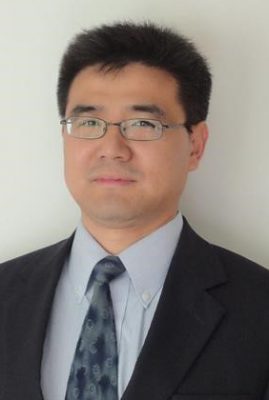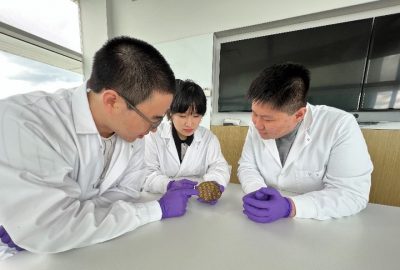
In recent years, from H1N1 and now to SARS-CoV-2, global pandemics caused by highly contagious viral species have been threatening human life and putting tremendous pressure on healthcare services as well as the economy. Rapid testing and timely interventions for asymptomatic or mild infections caused by SARS-CoV-2, for example, would enable efficient quarantine of infected patients, thus significantly reducing the spread rate of the virus. Importantly, SARS-CoV-2 is expected to continue in the future fall/winter seasons, when it will coincide with the seasonal outbreak of other infectious respiratory diseases, including those caused by influenza virus and respiratory syncytial virus, which have similar signs and symptoms in the early stages. Considering the overlap in the seasonal peaks, symptoms, and underlying risk factors of these illnesses, having a rapid test to detect and differentiate SARS-CoV-2 from other infectious respiratory viruses will be clinically important.
In response to this clinical need, the Institute of Materials Science and Biomedical Engineering Assistant Professor Yi Zhang led the development of the most sensitive amplification-free SARS-CoV-2 diagnostic platform, the CRISPR Cas13a graphene field-effect transistor. This study, entitled “Amplification-Free Detection of SARS-CoV-2 and Respiratory Syncytial Virus Using CRISPR Cas13a and Graphene Field-Effect Transistors,” was published online on May 12, 2022, in the journal Angewandte Chemie International Edition.
“The key features of viral diagnostics are rapidness and sensitivity,” said Zhang. According to Zhang, most virus detection techniques, including the gold-standard RT-PCR, relies on viral sequence amplification, which can dramatically complicate the detection process and increase the risk of cross-contamination, therefore subject to elevated false-positive rates. However, current amplification-free methods are still limited by compromised sensitivity. “Our work revolutionized the field of amplification-free nucleic acid diagnostics by introducing a biosensing platform with sensitivity comparable with RT-PCR,” he said.
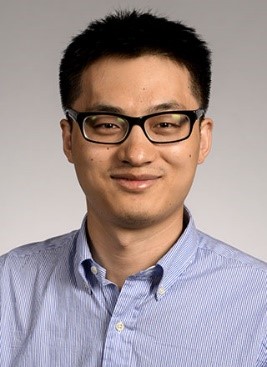
Derived from adaptive immunity in prokaryotes, Nobel-winning clustered regularly interspaced short palindromic repeats (CRISPR)/CRISPR-associated (Cas) technology leverages nucleic acid base pair complementarity between a guide RNA and targeted nucleic acid sequence and affords high target specificity capable of discriminating single mismatches. Recently, several CRISPR/Cas systems, including Cas13a, were found to perform cleavage of nonspecific bystander nucleic acid probes triggered by target detection, known as “collateral cleavage.” Such collateral cleavage demonstrates a multi-turnover behavior, turning a single target recognition event into multiple probe cleavage events, and therefore leads to signal amplification.
“The idea of our biosensor design originates from exploiting the signal amplification by translating CRISPR technology onto an ultrasensitive detection platform,” said Huijie Li, a Ph.D. student in Zhang’s lab; she is also the leading first author of the study. Graphene, as a two-dimensional material, exhibits extraordinary charge carrier mobility and thus high electrical conductivity. Thanks to its atomic thickness, graphene, when constructed into biosensors as a sensing material, is highly sensitive to the interaction with biological analytes. In this study, by immobilizing probes on graphene-based field-effect transistors and allowing Cas13a collateral cleavage of these probes activated by target detection, SARS-CoV-2 down to 1 aM level in both spiked and clinical samples, was successfully detected within a 30 min detection time.
Simply by changing the guide RNA design, CRISPR Cas13a graphene field-effect transistor platform was reconfigured to target respiratory syncytial virus with the same attomolar sensitivity. “As the COVID-19 pandemic wanes, our virus diagnostic tool can be easily adapted to combat the future outbreak of unknown viral species,” Guangfu Wu, a Postdoc in Zhang’s lab; he is the co-first author of this work, said.
This study marks a significant milestone towards our goal of developing an integrated point-of-care biosensing platform for viral diagnostics. “We are aiming to offer patients a fast, ultrasensitive all-in-one tool that can streamline sample treatment and analysis and deliver results without any specialized training,” said Zhengyan Weng, a Ph.D. student in Zhang’s lab; he is also the co-first author of this study.
This research is supported by the University of Connecticut start-up and the National Science Foundation under the award number CBET-2103025. The collaborators of this work include Dr. Xue Gao at Rice University (co-corresponding author), Drs. Kevin D. Dieckhaus and Lori Avery at UConn Health, and Dr. Yupeng Chen in the Department of Biomedical Engineering at UConn.
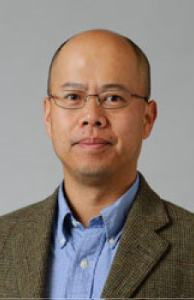


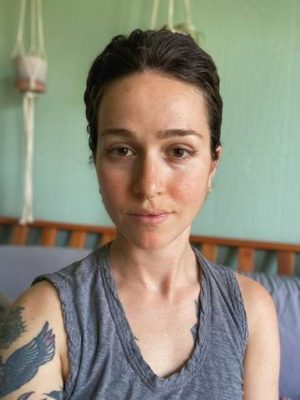 Schriber, a second-year materials science graduate student in the lab of assistant professor of chemistry
Schriber, a second-year materials science graduate student in the lab of assistant professor of chemistry 
 With the assistance of faculty mentors, UConn students in all majors, across all UConn campuses, conduct research or creative projects each year in pursuit of the Summer Undergraduate Research Fund (SURF) Award.
With the assistance of faculty mentors, UConn students in all majors, across all UConn campuses, conduct research or creative projects each year in pursuit of the Summer Undergraduate Research Fund (SURF) Award. 
